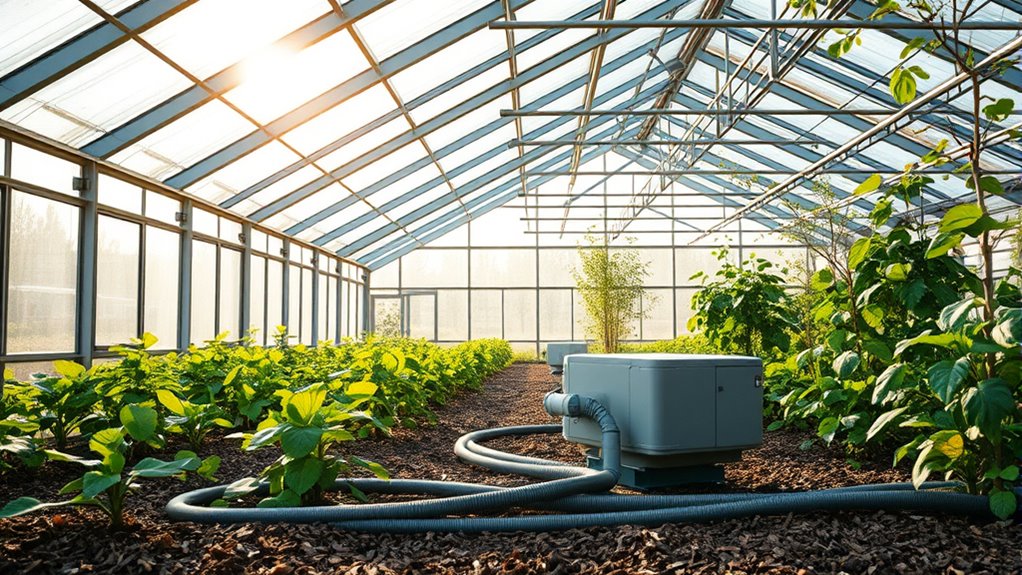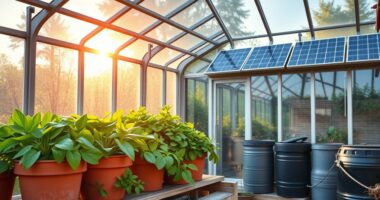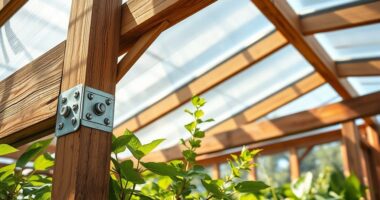Eco-friendly heating options for greenhouses include solar thermal systems and biomass boilers, which help reduce your environmental impact while maintaining *best* temperatures. Solar thermal taps into sunlight to generate heat with minimal ongoing costs, while biomass boilers burn organic materials like wood chips or pellets for reliable warmth. Combining these systems ensures you can keep your greenhouse warm year-round sustainably. If you want to explore how these options work together, there’s more to uncover below.
Key Takeaways
- Solar thermal systems capture sunlight to generate heat, reducing reliance on fossil fuels and lowering carbon emissions.
- Biomass boilers burn organic materials like wood chips or pellets for sustainable, cost-effective greenhouse heating.
- Combining solar thermal and biomass systems ensures year-round temperature regulation with minimal environmental impact.
- Both options offer renewable, low-operational-cost heating solutions suitable for various greenhouse sizes and budgets.
- Implementing these eco-friendly technologies supports sustainable agriculture and reduces the greenhouse’s overall carbon footprint.

Heating greenhouses sustainably is essential for maintaining ideal plant growth while minimizing environmental impact. When you’re looking to keep your greenhouse warm without relying on fossil fuels, exploring eco-friendly heating options becomes crucial. Two effective solutions you should consider are solar thermal systems and biomass boilers, both of which can significantly reduce your carbon footprint and operate efficiently.
Solar thermal technology harnesses the power of the sun to generate heat, making it an excellent renewable option for greenhouse heating. By installing solar collectors on your greenhouse roof or nearby, you can capture sunlight and convert it into thermal energy. This heat can then be stored in insulated water tanks or used directly to warm the air and soil inside your greenhouse. The beauty of solar thermal systems is that they have no ongoing fuel costs, and once set up, they require minimal maintenance. During sunny days, you can generate a substantial amount of heat, reducing your reliance on conventional energy sources. While solar thermal alone might not be sufficient during extended cloudy periods or winter nights, pairing it with other sustainable heating methods can ensure a consistent temperature year-round. Additionally, integrating energy-efficient components can further optimize system performance and longevity.
Harness the sun’s energy with solar thermal systems for sustainable greenhouse heating year-round.
Biomass boilers provide another eco-friendly way to heat your greenhouse. These boilers burn organic materials like wood chips, pellets, or agricultural waste to produce heat. Biomass is considered a renewable resource because it’s derived from plant materials that can be replanted and harvested sustainably. Installing a biomass boiler in your greenhouse offers a reliable and cost-effective heating solution, especially if you have access to a steady supply of biomass. These boilers can be automated to operate efficiently, and modern designs minimize emissions, making them cleaner than traditional fossil fuel burners. Plus, using locally sourced biomass reduces transportation emissions and supports local economies. You can also combine biomass boilers with thermal storage systems to better manage heat distribution and ensure warmth during colder periods.
Both solar thermal systems and biomass boilers are adaptable to different greenhouse sizes and budgets. They allow you to lessen your dependence on grid electricity or fossil fuels, which not only benefits the environment but can also lower your operational costs over time. Implementing these technologies demonstrates your commitment to sustainable practices and helps you cultivate a healthier ecosystem around your greenhouse. By investing in eco-friendly heating options like solar thermal and biomass boilers, you’re taking meaningful steps toward a more sustainable future for your plants and the planet.
Frequently Asked Questions
How Do Eco-Friendly Heaters Compare in Cost to Traditional Options?
Eco-friendly heaters tend to have a higher initial cost compared to traditional options, but their long-term savings and environmental impact make them worthwhile. The cost comparison shows that eco-friendly systems often use less energy, reducing your utility bills over time. Plus, they produce fewer emissions, helping you lower your greenhouse’s environmental impact. Investing in eco-friendly heaters can be more economical and sustainable in the long run, benefiting both your budget and the planet.
What Maintenance Is Required for Sustainable Greenhouse Heating Systems?
You’ll need to perform biannual filter checks and annual system inspections to keep your sustainable greenhouse heating system running smoothly. For example, a community greenhouse found that regular filter replacements improved efficiency and reduced energy costs. By maintaining filters and inspecting components yearly, you guarantee peak performance, prevent breakdowns, and extend your system’s lifespan. Consistent upkeep is key to maintaining an eco-friendly and reliable heating solution.
Can Eco-Friendly Heating Methods Be Used in All Climate Zones?
Eco-friendly heating methods can be adapted to most climate zones, but you need to think about climate zone adaptation and energy efficiency. In colder areas, you might combine solar with radiant floor heating, while in milder zones, passive solar or biomass could suffice. Always evaluate your local climate and energy efficiency considerations to choose the best eco-friendly heating solution, ensuring your greenhouse stays productive year-round without excessive energy use.
Are There Any Government Incentives for Installing Green Heating Systems?
Think of government incentives as a helpful hand guiding you toward greener choices. Yes, you can find government grants and tax incentives for installing eco-friendly heating systems. These programs aim to make sustainable technology more affordable, reducing your costs while helping the environment. Check with local authorities or energy agencies to discover available programs. Taking advantage of these incentives can turn your eco-friendly greenhouse dreams into reality, like planting seeds for a greener future.
How Long Is the Typical Lifespan of Eco-Friendly Greenhouse Heaters?
You can expect the typical lifespan of eco-friendly greenhouse heaters to be around 10 to 15 years, depending on heater durability and maintenance. Proper care, such as regular inspections and cleaning, extends their lifespan durability. High-quality models with durable components tend to last longer, providing reliable heating for your greenhouse. Keep in mind that some systems may need minor repairs over time, but overall, eco-friendly heaters are a long-term investment.
Conclusion
Choosing eco-friendly heating options for your greenhouse not only supports a sustainable future but also nurtures your plants with care. While traditional methods may seem easier, they often harm the environment and drain resources. By embracing greener alternatives, you create a haven of growth that benefits both your plants and the planet. In the end, your commitment to eco-conscious heating transforms your greenhouse into a sanctuary—where innovation meets responsibility, and nature thrives alongside you.









